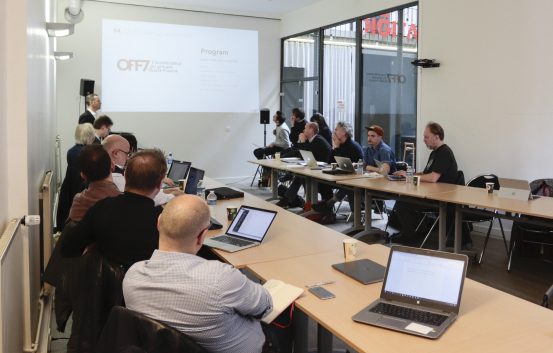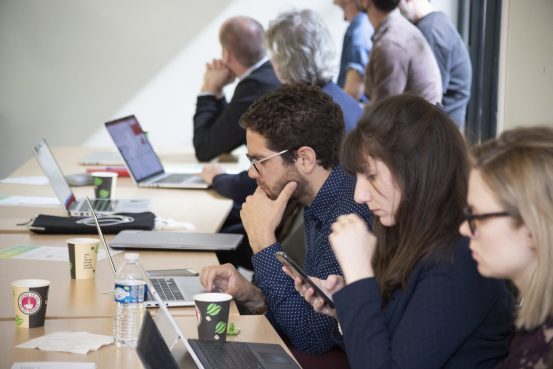Media Labs Day Paris: studying the innovation landscape in news media and other industries
Over 30 media professionals and innovation lab leaders from around the world took part in the fourth edition of the Media Labs Day on 8 April 2019, hosted by Cap Digital in Paris.
Media Labs Days are a series of events, organised by WAN-IFRA’s Global Alliance for Media Innovation (GAMI), that bring together leading innovation professionals working in the news media to share insights and best practices, allowing them to learn from each others’ successes and failures.
For this edition of Media Labs Day, we decided to highlight regional Media Labs in France, as well as expanding our focus to examine innovation in broadcasting and other industries. See the full event programme here.
The event kicked off with pitches by three startups incubated by the host Cap Digital, one of the largest innovators’ collectives in the European digital ecosystem. Frédéric Petitpont, CEO of Newsbridge, described the simple issue the company aims to solve: since the amount of video content created by media companies is skyrocketing, it has become overwhelmingly difficult to find relevant video footage. Newsbridge’s solution employs contextual AI and cognitive search, allowing journalists to find the footage they need quickly and publish new content faster.
Next, Julien Verdier, CEO of Adyoulike, presented the company’s native advertising platform service to publishers and advertisers. The platform supports what the company calls “Deep Native Advertising” formats, which provide the same experience as ads on Snapchat or Instagram, but created for the open web. Verdier described the service as “Taboola 2.0”, allowing publishers to insert their own content, content from other publishers, as well as ads.
Attending the 4th Medialab Day in Paris with @wanifra_mihub in @Cap_Digital
Several #newstech startups pitching like @newsbridge_io @Adyoulike and newly seeded elocance in synthetic voicing.#MLDParis https://t.co/ufFe5PijIK— Denis Teyssou (@dteyssou) April 8, 2019
The final pitch was from a company that is tapping into the rising trend of audio content with its soon to be released tool. People have a hunger for informative and educational content, but they have less and less time to read it, or “at the end of the day, your eyes are too tired to read on the screen,” said Alexis Botaya, CEO of Elocance. The firm’s solution is to provide a text-to-audio converter that works with any written text, and features a more pleasant automated voice than other options on the market.
Surveying regional Media Labs in France
The second round of presentations highlighted some interesting cases in the French Media Labs community. First up was Laura Pironnet, Media Manager at Le MAS, the innovation space started by the Nice-Matin newspaper. The publisher launched Le MAS this January to seek new revenue sources and to help transform the company’s internal culture, while gathering the local entrepreneurial ecosystem. Pironnet pointed out that although many publishers want to do something similar, each company is different and operates in a different context, which is why the same innovation strategy will not work for everyone. (Read more about Le MAS here.)
.@LauraPironnet presents Le MAS, Nice-Matin's new innovation space. Read more about the Le MAS here: https://t.co/yvkFUvXN4D #MLDParis pic.twitter.com/Nve6uxWR1k
— Global Alliance for Media Innovation (@wanifra_mihub) April 8, 2019
Next we headed west of France: Jean-Pierre Besnard, Programme Manager at Ouest France, presented the publisher’s work with startups and particularly OFF7, the newspaper’s accelerator that offers startups acceleration programmes within the media group. Besnard emphasised the benefits that come from connecting established newspapers and young companies: “The relationship with time is different. Since startups have a different way of working, it helps us be more agile.”
Finally, Raphaël Poughon, Medialab & Incubation Program Manager at La Compagnie Rotative, presented the incubator established by the Centre France media group five years ago. Based in Clermont-Ferrand, La Compagnie Rotative aims to engage the local community of startups and other innovation professionals through its incubation program. One way the company is doing this is through live events: two years ago it held an event focusing on data journalism, and in early April it organised the Magma Startup Festival, featuring over 40 companies from the region.
At the end of the session, the speakers addressed an important question from the audience: how can media companies convince startups to work with them, rather than joining a more traditional startup incubator/accelerator. Everyone agreed that news publishers’ greatest asset is their audience. Poughon said that Ouest France’s location in central France gives it access to the region’s audience, skills and data, so the media group can offer a kind of a sandbox to an interested startup. Nice-Matin is very much in the same situation: “We are realising that no one else can really offer what we can,” Pironnet said. “You can’t find the kind of community that a local newspaper has elsewhere.”
Taking a look at broadcasting
Before the start of the next session, Neil Maiden, Professor of Digital Creativity from City, University of London, gave a quick introduction to INJECT, a new tool that helps journalists discover new angles and sources to their stories. INJECT is now in the process of launching a startup business around the tool – for more details and to get involved, check the project’s website.
The next session continued on the theme of innovation, but specifically in the domain of broadcasting. Damian Machaj, Multimedia Content Producer at the Czech Radio, described the innovation unit the company launched in 2016 to support its two newsrooms: one producing on-air audio content, the other maintaining an online news platform. The team has worked mostly on audio-related projects, including a news podcast that provides a deep dive into one news item per episode, as well as exploring ways of engaging young audiences.
From radio to television: Barbara Chazelle discussed how France Télévisions, the French public broadcaster, approaches innovation. The company created its Media Lab two years ago, and also started the blog Meta-media dedicated on the future of journalism. Chazelle highlighted three main challenges they’ve encountered: 1) Innovation is about mediation and connecting the right people, 2) Broadcast mindset is not wide enough, but new ways of thinking are needed, and 3) Innovation cannot only exist in the Lab, but has to be expanded everywhere in the organisation.
Now innovations in broadcasting @wanifra_mihub with @barbaragip presenting @metamedia @Francetele Medialab @Cap_Digital #MLDParis pic.twitter.com/YbgznNhL2X
— Denis Teyssou (@dteyssou) April 8, 2019
Moving onto the Netherlands, Geert-Jan Strengholt, Creative Director of the VPRO Innovation and Digital Media talked about how the Dutch public broadcaster has used its MediaLab to break out of the bubble of broadcasting. One central focus has been exploring new ways of storytelling, as well as testing immersive media, AI, big data and wearable tech. One insight the team had lead to the abandoning of VR, after concluding that there effective is no distribution platform: “With VR, you have to go out there with the equipment, and take it to the audience.”
Finally, Kåre Vedding Poulsen, Cross Media Manager from DR described the wide range of innovation projects at the Danish broadcaster. He emphasised the importance of collaboration, both among the news media and with the audience: “Users are assets: 5 million average brains are smarter than one smart one.” His advice was to have a sense of direction, and allocate resources accordingly, but not think that you can predict the specific results that come from a research project. Or, as he put it: “Don’t insult the future by planning”.
Innovation in industries other than news
The final round of speakers were from outside the news media altogether, describing how their respective industries approach innovation. The first presentation was by Pascal Latouche, Head of Orange Fab France and Network, the accelerator network by the French telecommunications company. The network has members in 17 countries, focusing on areas such as mobile payments, data management and high-speed broadband.
According to Latouche, the startups that Orange works with can benefit from the large pool of the corporation’s customers. But during the past year, there has been a rise in the number of media startups, which it would be interested in connecting with the relevant media companies. “Disruptive startups can have a big impact on your industry, so it’s crucial to make tactical connections,” he said.
The Orange group Fabs network work with 17 Fab labs in 4 continents. They provide marketable solutions to Orange business lines. It’s not about incubation, it’s about developing business and advance solutions to the market #MLDParis pic.twitter.com/Jlxd775wcU
— Vincent Peyregne (@vincentpeyregne) April 8, 2019
Next, Anastasia Troyanov, Investment Analyst at APX, presented the accelerator that was launched jointly by Axel Springer and Porsche, two companies working in very different kinds of industries. APX is an early-stage investment fund that offers a personalised program to young companies with digital user-centric business models. Founded in March 2018, the accelerator has made 20 investments so far, and looks into doubling the number next year.
The collaboration between a major media house and a prestige car manufacturer may seem surprising, but Troyanov said that since both were interested in early-stage investment and are market leaders in their industries in Germany, working together came naturally. The accelerator’s goal is not so much to create connections between the automotive and media industries, but rather to allow the two companies to benefit from their shared interest in early-stage investment.
Finally, Jérôme Doncieux, Co-Fondateur and CEO of Relaxnews, and Franck Louis-Victor, Global Director for Connected Cloud and Services at the Renault-Nissan-Mitsubishi Alliance, presented their ambitious vision built on a simple idea: even if automated cars arrive one day, the time spent commuting is never going away. “What will make the difference between brands is the experience we deliver to the customer – both on and off board,” said Louis-Victor.
News organisations need more cross-industry partnerships. @wanifra_mihub invites Franck Louis-Victor (RenaultAlliance), Jérôme Doncieux (Publicis) and @fsitterle (Challenges) partners and CO founders of AEX, the next generation in-car content platform #MLDParis pic.twitter.com/PO6uxTUHWt
— Vincent Peyregne (@vincentpeyregne) April 8, 2019
Their initiative, Augmented Editorial Experience (AEX), was launched at the Paris Motor Show 2018, and aims to create future opportunities for car makers and their content partners. Currently, the only type of media that is truly adapted to the car is radio, which offers very little differentiation and generally an old-fashioned experience. Although still in its early stages, AEX aims to become the leading in-car content platform, replacing the radio with a combination of breaking, evergreen and seasonal content from media partners, while building a business model that is comparable with Spotify or Netflix.
The day concluded with a visit to France Télévisions, where the participants were taken around the newsroom and the studio of the Franceinfo news channel.
Happy to host the #MLDparis participants at @francetele. Now visiting @franceinfo with the brilliant @JeanCChretien and the MediaLab. pic.twitter.com/KRiEivEPou
— barbara chazelle (@barbaragip) April 8, 2019
The Media Labs Day on 8 April 2019 in Paris was the fourth live event connected to our ongoing Media Innovation Mapping project. Read about the 50+ Media Labs we have covered so far, or contact us to share your story.


